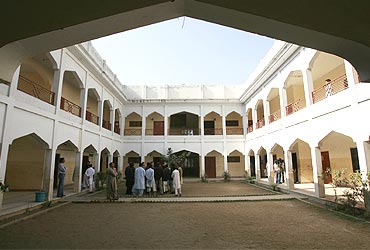This article was first published 15 years ago
Home »
News » LeT very dangerous, but NOT more than Al Qaeda: US
LeT very dangerous, but NOT more than Al Qaeda: US
Last updated on: November 18, 2010 13:21 IST
Image: A school owned by Jamaat-ud-Dawa in Muridke
Photographs: Mohsin Raza/Reuters
The Barack Obama administration's Coordinator for Counterterrorism at the Department of State Daniel Benjamin, in an interaction with rediff.com on Wednesday, has admitted that the social service the Lashkar-e-Tayiba delivers through its front organisations like Jamat-ud-Dawah make the terror outfit even more insidious and dangerous.
He made the observations after his opening remarks at the Foreign Press Centre about the veracity of Pakistan's commitment to eliminate the LeT.
Benjamin said, "Obviously the LeT is a profoundly dangerous group and the support it derives from doing social service is of course of great concern."
"And, that is why it is critically important that Pakistan continues to develop its institutions and develop the ability to provide the services to its people so that other organisations with a radical agenda are not in there subverting the state," he said.
Benjamin pointed out that this "is really one of the reasons why programmes such as Kerry-Lugar-Berman (US legislation that provides for $1.5 billion a year for Pakistan) is so important, as well as the important support for Pakistan that other countries are providing. And, of course, in the aftermath of the devastating floods, is all the more important that we be able to ensure that the Pakistani people have the basic resources they need to get on with their lives and that it's not being delivered to them with an extremist message."
Reportage: Aziz Haniffa
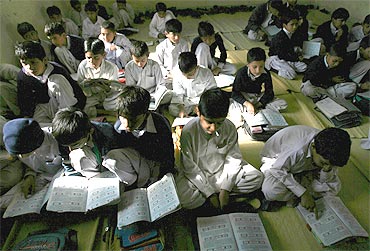
Image: Students inside the classroom of a school in Jamaat-ud-Dawa's headquarters
Photographs: Mohsin Raza/Reuters
Thus, he argued that "over the long-term the key is a strong state that can provide for the needs of its people."
But when challenged by rediff.com that this is a futuristic outlook and it rationalises the Pakistani argument that it's not easy to eliminate the LeT or Jamat-ud-Dawah overnight, he said, "I didn't mean to suggest that we are short-changing any of the important intelligence and law enforcement cooperation that we are carrying on with partners around the world."
"We are delighted that many in the region are very concerned about the LeT threat and are cooperating much more effectively," he added.
Benjamin referred to his opening remarks where he had mentioned the cooperation between Bangladesh and India, which he said, "had a real breakthrough in this area in terms of their coordination."
He reiterated, "We are working very closely with all the partners, but obviously a lot of this kind of cooperation is sensitive so I cannot give details but rest assured that we are working hard to ensure that there won't be future attacks."
But he acknowledged, "Obviously we know how difficult this business is and how hard it is to achieve perfect success. But, as my earlier comments also indicated, this is very much on our screen right now and very much a matter of concern."
Benjamin said, "We don't want to see LeT filling that hole in global extremism as Al Qaeda itself is diminished."
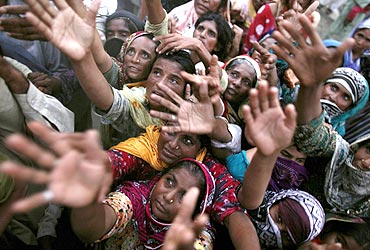
Image: Flood victims reach for handouts in Pakistan's Muzaffargarh district of Punjab province
Photographs: Damir Sagolj/Reuters
In his opening remarks, referring to the three-part investigative series by Pro-Publica published by the Washington Post on the LeT, the senior US official said, "Very few things worry me as much as the strength and the ambitions of LeT, which is truly a maligned presence in South Asia."
Benjamin said, "As the two-year anniversary of Mumbai terror attack approaches, we continue to work very closely with our inter-agency partners and international allies to reduce the threat from this very dangerous group and I am pleased to say that there is growing cooperation in the region to thwart the LeT, especially between such critical partners as India and Bangladesh."
But when reminded that earlier in the year, he had spoken of how dangerous the LeT was and how is would soon replace Al Qaeda, Benjamin said, "I don't think I ever said LeT was more dangerous than Al Qaeda, but it's certainly a very, very dangerous group."
Earlier, this year, in a major address to the Terrorism and Homeland Security Forum co-sponsored by the Woodrow Wilson Center's International Security Studies and Georgetown University's Center for Peace and Security Studies, Benjamin had said, "Al Qaeda is not the only group with global ambitions that we have to worry about operating in South and Central Asia, nor is it our only focus."
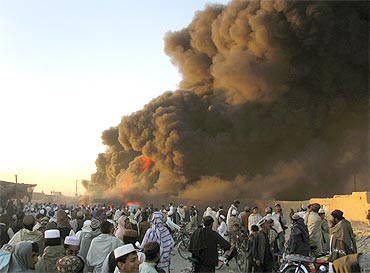
Image: Tribesmen gather near burning fuel tankers after they were attacked in Chaman in Pakistan's Balochistan province
Photographs: Saeed Ali Achakzai/Reuters
In a speech, titled Counterterrorism in the Obama Administration: Tactics and Strategy, he noted, "Lashkar-e-Tayiba has made it clear that it is willing to undertake bold, mass casualty operations with a target set that would please Al Qaeda planners."
He recalled, "The group's most recently thwarted conspiracy to attack the US embassy in Dhaka should only deepen concern that it could indeed evolve into a genuinely global threat and one that seeks to replace Al Qaeda or at least compete with it."
At the briefing on Wednesday, the top US counterterrorism official recalled that at the recent US-Pakistan Strategic Dialogue, Secretary of State Hillary Clinton had said, "The United States has no stronger partner than Pakistan when it comes to countering terrorism against the extremists who threaten us both."
Benjamin said, "Pakistan has helped the United States put out of business in one way or another, more Al Qaeda operatives than any other country on earth by a large margin."
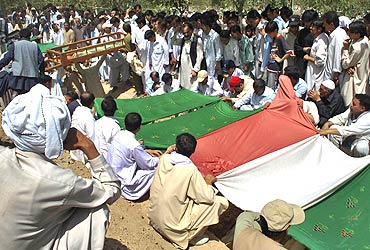
Image: Locals cover the graves of victims killed during a terror attack on a Shia procession in Quetta
Photographs: Rizwan Saeed/Reuters
"Pakistan has suffered grievously from militancy and I believe that Pakistan's leadership understands very well the nature of the threat and the imperatives to combat it," he said. "And, I can assure you that my view on this is the view of the President and the Secretary of State and everyone else who is involved."
Benjamin said, "We are all acutely aware of the losses Pakistan has suffered in bombings, in firearm attacks and the like on police, on all kinds of different security facilities."
"So, I don't think there is any question that Pakistan is a key partner and that will continue to be our emphasis, our contention," he added.
Benjamin, who is the co-chair of the working group on Law Enforcement and Counterterrorism efforts in this Strategic Dialogue, also disclosed that "the US is also providing training to Pakistan police forces and assisting that country with programmes to address terrorist finance issues."
